

Words I Never Want to See in Your Novel. Please. Let’s Talk Again! Quote. 25 Things You Should Know About Character. Previous iterations of the “25 Things” series: 25 Things Every Writer Should Know 25 Things You Should Know About Storytelling And now… Here you’ll find the many things I believe — at this moment!

— about characters: 1. Without character, you have nothing. 2. A great character can be the line between narrative life and story death. Tension. File:Plutchik-wheel.svg - Wikipedia, the free encyclopedia. Cancel Edit Delete Preview revert Text of the note (may include Wiki markup) Could not save your note (edit conflict or other problem).

Please copy the text in the edit box below and insert it manually by editing this page. Upon submitting the note will be published multi-licensed under the terms of the CC-BY-SA-3.0 license and of the GFDL, versions 1.2, 1.3, or any later version. See our terms of use for more details. Add a note Draw a rectangle onto the image above (press the left mouse button, then drag and release). Save To modify annotations, your browser needs to have the XMLHttpRequest object.
[[MediaWiki talk:Gadget-ImageAnnotator.js|Adding image note]]$1 [[MediaWiki talk:Gadget-ImageAnnotator.js|Changing image note]]$1 [[MediaWiki talk:Gadget-ImageAnnotator.js|Removing image note]]$1. General Fiction. Getting Around...
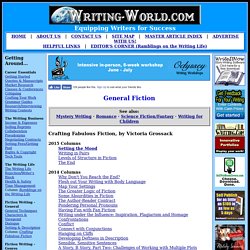
Career Essentials Getting Started Queries & Manuscripts Market Research Classes & Conferences Critiquing Crafting Your Work Grammar Guides Research/Interviewing Writing Contests The Writing Business Income & Expenses Selling Reprints Collaboration Pseudonyms Negotiating Contracts Setting Fees/Getting Paid Rights & Copyright Tech Tools The Writing Life The Writing Life Rejection/Writer's Block Health & Safety Time ManagementColumn: Ramblings on the Writing Life. Creating Villains People Love to Hate. By Lee Masterson Every story has to have a bad guy.
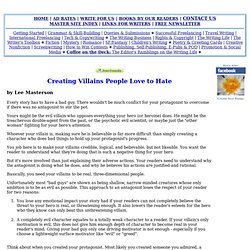
There wouldn't be much conflict for your protagonist to overcome if there was no antagonist to stir the pot. Yours might be the evil villain who opposes everything your hero (or heroine) does. He might be the treacherous double-agent from the past, or the psychotic evil scientist, or maybe just the "other woman" fighting for your hero's attention. Whoever your villain is, making sure he is believable is far more difficult than simply creating a character who does bad things to hold up your protagonist's progress. Fundamentals of Fiction: Being Realistic. By Marg Gilks "I am always interested in why young people become writers, and from talking with many I have concluded that most do not want to be writers working eight and ten hours a day and accomplishing little; they want to have been writers, garnering the rewards of having completed a best-seller.
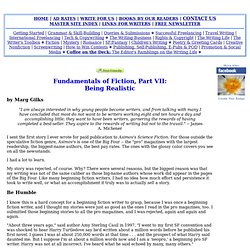
They aspire to the rewards of writing but not to the travail. " -- James A. Michener I sent the first story I ever wrote for paid publication to Asimov's Science Fiction. Fundamentals of Fiction: Avoid Those Beginners' Blunders. By Marg Gilks "Writing is easy; all you do is sit staring at a blank sheet of paper until the drops of blood form on your forehead.
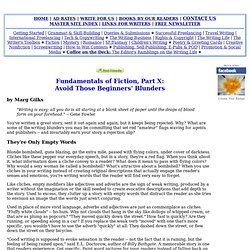
" -- Gene Fowler You've written a great story, sent it out again and again, but it keeps being rejected. Why? What are some of the writing blunders you may be committing that set red "amateur" flags waving for agents and publishers -- and invariably earn your story a rejection slip? They're Only Empty Words Blonde bombshell, guns blazing, go the extra mile, passed with flying colors, under cover of darkness. The 10 Types of Writers Block (and How to Overcome Them) Archetypal characters in the Hero’s Journey » Jordan McCollum. A quick overview of the Hero’s Journey » Jordan McCollum. Planning out a novel?
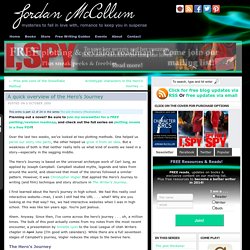
Be sure to join my newsletter for a FREE plotting/revision roadmap, and check out the full series on plotting novels in a free PDF! Over the last two weeks, we’ve looked at two plotting methods. Find Synonyms and Antonyms of Words at Thesaurus.com. A story in three acts » Jordan McCollum.
The most basic story structure is the story in three acts. The three act structure has been used since . . . well, forever, but in recent history, the biggest proponent of this structure is Syd Field in his book Screenplay (although it’s been applied to all kinds of stories, not just movies). A Simple Novel Outline - 9 questions for 25 chapters & H.E. Roulo. Just as every tree is different but still recognizably a tree, every story is different but contains elements that make it a story.
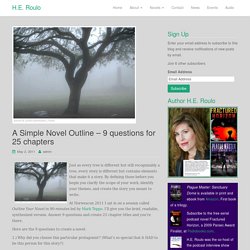
By defining those before you begin you clarify the scope of your work, identify your themes, and create the story you meant to write. At Norwescon 2011 I sat in on a session called Outline Your Novel in 90-minutes led by Mark Teppo. I’ll give you the brief, readable, synthesized version. Answer 9 questions and create 25 chapter titles and you’re there. Here are the 9 questions to create a novel: 1.) 2.)